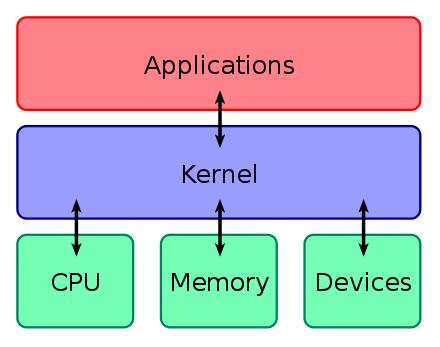Kernel
The kernel is a computer program that’s part of the OS which has complete control over everything in the system.
- exists in main memory
- Contains most frequently used functions

From what I understand, the kernel is like the central powerhouse of the computer, it is what decides how much CPU to use for each application, how much memory to use.
- It is responsible for managing hardware resources, providing low-level services, and enabling communication between software and hardware
- Interacts directly with the hardware, handling tasks such as process management, memory management, device drivers, and input/output operations
Operating System vs. Kernel?
This is confusing, I was speaking with Hemal Shah about the CUDA stuff and JetPack, since we required people to be on Ubuntu 20.04.
Docker and kernels:
- You generally can’t install drivers inside a Docker container because drivers operate at the kernel level and Docker containers share the host’s kernel.
The Kernel is the most fundamental part of the OS, operating at the core of the system with complete control over everything in the system. It is responsible for several critical operations:
- Memory Management: Manages the system’s memory, deciding which processes can use memory at what times and managing memory protection and paging.
- Process Management: Handles the creation, scheduling, and termination of processes.
- Device Management: Acts as a mediator between the hardware and software components, using device drivers to communicate with hardware.
- System Calls and Security: Provides an interface for user applications to access hardware resources and system services securely.
Machine Learning
I hear this word being used a lot. It’s from Statistics.
The term kernel is used in statistical analysis to refer to a window function. The term “kernel” has several distinct meanings in different branches of statistics.
From NVIDIA
From my CUDA course, I simply think of kernels as like GPU functions.